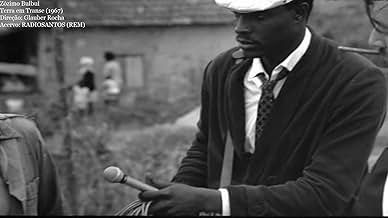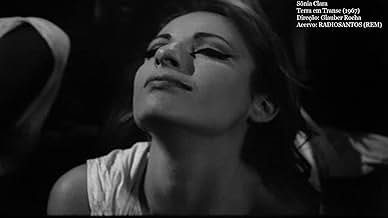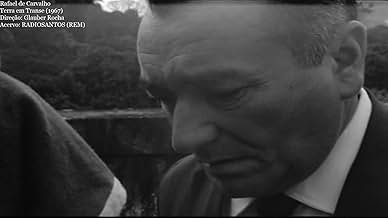VALUTAZIONE IMDb
7,3/10
3841
LA TUA VALUTAZIONE
In un fittizio paese dell'America Latina chiamato Eldorado, un poeta prova a portare un cambiamento politico, tentando di influenzare uomini importanti.In un fittizio paese dell'America Latina chiamato Eldorado, un poeta prova a portare un cambiamento politico, tentando di influenzare uomini importanti.In un fittizio paese dell'America Latina chiamato Eldorado, un poeta prova a portare un cambiamento politico, tentando di influenzare uomini importanti.
- Regia
- Sceneggiatura
- Star
- Premi
- 2 vittorie e 1 candidatura in totale
Jofre Soares
- Father Gil
- (as Joffre Soares)
Thelma Reston
- Felício's wife
- (as Telma Reston)
Emmanuel Cavalcanti
- Felício
- (as Emanuel Cavalcanti)
Recensioni in evidenza
Following his fascinating portrayal of outlaw Antonio das Mortes and the dying days of banditry, Black God, White Devil (1964), Brazilian director Glauber Rocha - only 28 at the time - made the dazzling, deliberately contradictory and admittedly plodding Entranced Earth, a kaleidoscopic satire of politics in Latin America and the mad dictators who seemed to delight their people only to oppress them once elected. Filmed with the free-styling vigour of the French New Wave, Entranced Earth is often exhausting but consistently breathtaking.
Told through the eyes of poet and journalist Paulo Martins (Jardel Filho), we first encounter him pleading angrily with governor Felipe Vieira (Jose Lewgoy) to fight back in the midst of a social uprising against his administration. We flash back to learn that they were once friends, with Paulo offering his support during the election process, only to see the the promises Vieira campaigned on go out the window as the people go hungry. Vieira's political opponent, conservative Porfirio Diaz (Paulo Autran), was also once Paulo's friend, and has spent his life in luxury away from public view until a chance to rule turns him into a raving, yet highly charismatic, lunatic.
Entranced Earth is quite a confusing film. It strides along shifting back-and-forth in time and between various characters, and the kinetic, in-your-face camera-work makes it difficult at times to decipher just what the hell is going on. As a time capsule and a piece of experimental film-making, it is fascinating and deserves to have each of its frames pulled apart and analysed. It's a leftist view that is without any overt political statements, and instead seems to set out to capture the political counter-culture of the 1960's (or the demise of it). By setting it in the fictional country of Eldorado, Glauber avoids commenting on any country in particular, but is clearly making a statement about Latin America. It may leave you confused and worn- out by the end, but it's political cinema with both an edge and a sense of humour, and takes its technical influences from the greats of world cinema.
Told through the eyes of poet and journalist Paulo Martins (Jardel Filho), we first encounter him pleading angrily with governor Felipe Vieira (Jose Lewgoy) to fight back in the midst of a social uprising against his administration. We flash back to learn that they were once friends, with Paulo offering his support during the election process, only to see the the promises Vieira campaigned on go out the window as the people go hungry. Vieira's political opponent, conservative Porfirio Diaz (Paulo Autran), was also once Paulo's friend, and has spent his life in luxury away from public view until a chance to rule turns him into a raving, yet highly charismatic, lunatic.
Entranced Earth is quite a confusing film. It strides along shifting back-and-forth in time and between various characters, and the kinetic, in-your-face camera-work makes it difficult at times to decipher just what the hell is going on. As a time capsule and a piece of experimental film-making, it is fascinating and deserves to have each of its frames pulled apart and analysed. It's a leftist view that is without any overt political statements, and instead seems to set out to capture the political counter-culture of the 1960's (or the demise of it). By setting it in the fictional country of Eldorado, Glauber avoids commenting on any country in particular, but is clearly making a statement about Latin America. It may leave you confused and worn- out by the end, but it's political cinema with both an edge and a sense of humour, and takes its technical influences from the greats of world cinema.
I have seen one other film by this guy, Deus e o Diabo na Terra do Sol, and was completely taken aback at the time: Soviet notions of montage spilled helter skelter over the sunbaked Brazilian plains into the most deranged onslaught of rigorously polemic kitsch. Marx sloganeering via Brecht filmed by Eisenstein and Welles. You either bowed our early or agreed to be annihilated in the cinematic rave.
This has more serious merit I believe, is more pensive, introspective work. Marx is puzzled over. Godard is stripped of hip and ironic complacency. Eisenstein is understood as more than blistering agitprop and in context of the new world the cinematic eye aspires to create. Is such a world worth the effort to materialize? And is it going to be as envisioned?
I recommend it on just the principle that it's a political film promoting discussion, involvement, examination. This is a rare thing to have, especially these days when film consistently shies away from the great turmoils and viewers - understandably so - are becoming increasingly bitter and desensitized to any political involvement that may change the world. Oh we keep voting, but worst of all we have come to terms that it doesn't really matter which way we do, haven't we?
No, this is political work from a time when it was still thought and anticipated that the world could be changed in one lifetime and film could be a tool to assist and herald change. The plot is about a young artist - poet and journalist - who will have to surmise his place and level of involvement in a complex narrative about a nation's past and future strife, the surrogate self of a filmmaker looking for the same.
That narrative is every bit as 20th century Latin American history has affirmed it. On one side there is flag, cross, the capital, the military-secret service complex, bureaucracy, control over state media, counter-revolution. On the other side there are workers' rights, agrarian reforms, redistribution of wealth, democracy, populism, propaganda, socialist rhetorics, the world revolution. The two sides compete for the gubernatorial elections of a fictional county called El Dorado, after the mythical 'Lost City of Gold' that obsessed conquistadors. The modern El Dorado is poor and downtrodden, its people meek and submissive, but still a coveted land for conquest and control. Oil, coal, diamonds, uranium, these are the new riches of mythical proportions.
All told, it's not really hard to discern who is the main recipient of Marxist ire here. Rocha gleefully tears through caricatures but moves on to make another point. Are the latter really ready and able to govern? Do they have a plan beyond bold proclamations? Are they backed by less insidious corporate interests?
Naturally our young poet is puzzled, having been involved with both parties. The film mirrors this inner strife: a non-linear narrative fragmented through many visual cut-ups, hand-held shots, New Wave dissonance, artificiality, internal landscape, poetry recitations, theatrical grandiloquence. Not all of it works, but it's translucent when it does.
As far as political-minded New Wave goes, I believe this has near as much merit as the films of Yoshishige Yoshida from Japan, Eros+Massacre and Heroic Purgatory.
Politics of the region are more complex and subtle than Rocha delves into. Shucks. A key insight into what this is, is the framing device: a dream of delirious death.
This has more serious merit I believe, is more pensive, introspective work. Marx is puzzled over. Godard is stripped of hip and ironic complacency. Eisenstein is understood as more than blistering agitprop and in context of the new world the cinematic eye aspires to create. Is such a world worth the effort to materialize? And is it going to be as envisioned?
I recommend it on just the principle that it's a political film promoting discussion, involvement, examination. This is a rare thing to have, especially these days when film consistently shies away from the great turmoils and viewers - understandably so - are becoming increasingly bitter and desensitized to any political involvement that may change the world. Oh we keep voting, but worst of all we have come to terms that it doesn't really matter which way we do, haven't we?
No, this is political work from a time when it was still thought and anticipated that the world could be changed in one lifetime and film could be a tool to assist and herald change. The plot is about a young artist - poet and journalist - who will have to surmise his place and level of involvement in a complex narrative about a nation's past and future strife, the surrogate self of a filmmaker looking for the same.
That narrative is every bit as 20th century Latin American history has affirmed it. On one side there is flag, cross, the capital, the military-secret service complex, bureaucracy, control over state media, counter-revolution. On the other side there are workers' rights, agrarian reforms, redistribution of wealth, democracy, populism, propaganda, socialist rhetorics, the world revolution. The two sides compete for the gubernatorial elections of a fictional county called El Dorado, after the mythical 'Lost City of Gold' that obsessed conquistadors. The modern El Dorado is poor and downtrodden, its people meek and submissive, but still a coveted land for conquest and control. Oil, coal, diamonds, uranium, these are the new riches of mythical proportions.
All told, it's not really hard to discern who is the main recipient of Marxist ire here. Rocha gleefully tears through caricatures but moves on to make another point. Are the latter really ready and able to govern? Do they have a plan beyond bold proclamations? Are they backed by less insidious corporate interests?
Naturally our young poet is puzzled, having been involved with both parties. The film mirrors this inner strife: a non-linear narrative fragmented through many visual cut-ups, hand-held shots, New Wave dissonance, artificiality, internal landscape, poetry recitations, theatrical grandiloquence. Not all of it works, but it's translucent when it does.
As far as political-minded New Wave goes, I believe this has near as much merit as the films of Yoshishige Yoshida from Japan, Eros+Massacre and Heroic Purgatory.
Politics of the region are more complex and subtle than Rocha delves into. Shucks. A key insight into what this is, is the framing device: a dream of delirious death.
I know that most people will consider this opinion as heretics, but I think this a bad movie. Despite the good cinematography and the many great actors. The script is an undevelopped and confusing mess, partially in a hurry, partially simply shallow, exceding in its chaotic expressionist improvisation. It is pretensious but lacks deepness and a more sophisticated social political critique. Dialogs are just bad. Technically, sound is also quite flawed. Edition is unjustifiably harsh sometimes, with abrupt cuts. Many scenes are partially documental, as they were shot with few actors and many extras who were indeed common people who ignored that the situation was fictious (it may work but is moral questionable). The only really good part is the small segment in which there is a kind of mockumentary about Porfirio Diaz. To resume, "Enhanced earth" is world-wide celebrated but seriously overrated.
Released on Mr Bongo in 2005 "Terra em Transe" is dated, and has a confused screenplay, although being magnificently updated regarding the lack of ethics and the amoral behavior of the politicians. If the reader has had the opportunity of reading Machiavelli's "The Prince", you'll probably see how the behavior of politicians remains unchanged along the centuries.
However, keeping in mind that in this is movie Brazil was under a tough military dictatorship, this movie is a milestone in the history of Brazilian New Cinema. Glauber Rocha was very braze, discussing forbidden themes such as fight of classes, manipulation of the submissive masses by the elites, corruption in politician, anarchism, campaign promises not kept after the elections, economical power of foreign groups (or countries) in Latin American countries and coup d'état. In 1967, "Terra em Transe" was awarded with "Great Prize" in the Locarno Festival (Switzerland); "Luis Buñuel Prize" in Cannes Festival; "Federation of International Critics Prize" in Cannes Festival; and Best Movie of the Year in the Air France Prize, among other prizes
However, keeping in mind that in this is movie Brazil was under a tough military dictatorship, this movie is a milestone in the history of Brazilian New Cinema. Glauber Rocha was very braze, discussing forbidden themes such as fight of classes, manipulation of the submissive masses by the elites, corruption in politician, anarchism, campaign promises not kept after the elections, economical power of foreign groups (or countries) in Latin American countries and coup d'état. In 1967, "Terra em Transe" was awarded with "Great Prize" in the Locarno Festival (Switzerland); "Luis Buñuel Prize" in Cannes Festival; "Federation of International Critics Prize" in Cannes Festival; and Best Movie of the Year in the Air France Prize, among other prizes
In the hypothetical Latin-American country of Eldorado, the idealistic and anarchist poet and journalist Paulo Martins (Jardel Filho) fights against the populist governor, Felipe Vieira (José Lewgoy), and the conservative president Porfirio Diaz (Paulo Autran), supported by revolutionary forces. Paulo is depressed, since the two corrupt politicians were his former friends and have been elected with his moral support.
In 2005, "Terra em Transe" is dated, and has a confused screenplay, although being magnificently updated regarding the lack of ethics and the amoral behavior of the politicians. If the reader has had the opportunity of reading Machiavelli's "The Prince", he or she will see how the behavior of politicians remains unchanged along the centuries. However, keeping in mind that this is a 1967 movie, and Brazil was under a tough military dictatorship, this movie is a milestone in the history of Brazilian New Cinema. Glauber Rocha was very braze, discussing forbidden themes such as fight of classes, manipulation of the submissive masses by the elites, corruption in politician, anarchism, campaign promises not kept after the elections, economical power of foreign groups (or countries) in Latin American countries and coup d'état. In 1967, "Terra em Transe" was awarded with "Great Prize" in the Locarno Festival (Switzerland); "Luis Buñuel Prize" in Cannes Festival; "Federation of International Critics Prize" in Cannes Festival; and Best Movie of the Year in the Air France Prize, among other prizes. My vote is eight.
Title (Brazil): "Terra em Transe" ("Land in Anguish")
In 2005, "Terra em Transe" is dated, and has a confused screenplay, although being magnificently updated regarding the lack of ethics and the amoral behavior of the politicians. If the reader has had the opportunity of reading Machiavelli's "The Prince", he or she will see how the behavior of politicians remains unchanged along the centuries. However, keeping in mind that this is a 1967 movie, and Brazil was under a tough military dictatorship, this movie is a milestone in the history of Brazilian New Cinema. Glauber Rocha was very braze, discussing forbidden themes such as fight of classes, manipulation of the submissive masses by the elites, corruption in politician, anarchism, campaign promises not kept after the elections, economical power of foreign groups (or countries) in Latin American countries and coup d'état. In 1967, "Terra em Transe" was awarded with "Great Prize" in the Locarno Festival (Switzerland); "Luis Buñuel Prize" in Cannes Festival; "Federation of International Critics Prize" in Cannes Festival; and Best Movie of the Year in the Air France Prize, among other prizes. My vote is eight.
Title (Brazil): "Terra em Transe" ("Land in Anguish")
Lo sapevi?
- QuizEldorado is a fictional country. It's entirely based on political and social issues of Brazil after 1964 while the country was under a military dictatorship that was over only in 1985.
- Citazioni
Felipe Vieira: The streets belong to the people, like the sky belongs to the condors.
- ConnessioniFeatured in Improvisiert und zielbewusst (1967)
- Colonne sonoreOtello: Overture
Music by Giuseppe Verdi
I più visti
Accedi per valutare e creare un elenco di titoli salvati per ottenere consigli personalizzati
- How long is Entranced Earth?Powered by Alexa
Dettagli
- Tempo di esecuzione1 ora 48 minuti
- Colore
- Mix di suoni
- Proporzioni
- 1.66 : 1
Contribuisci a questa pagina
Suggerisci una modifica o aggiungi i contenuti mancanti

Divario superiore
By what name was Terra in trance (1967) officially released in India in English?
Rispondi





























